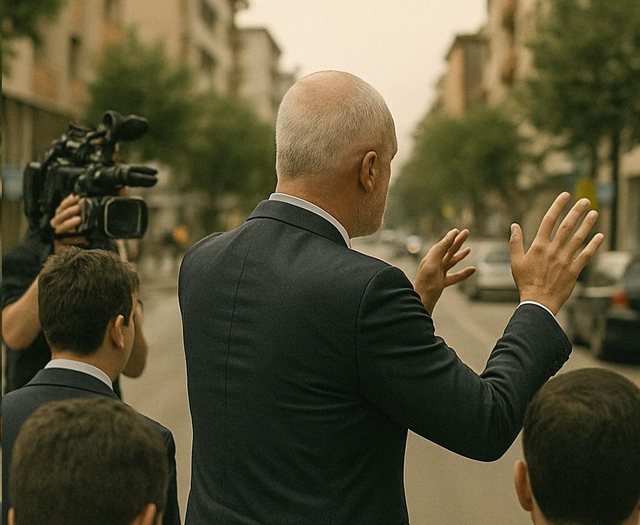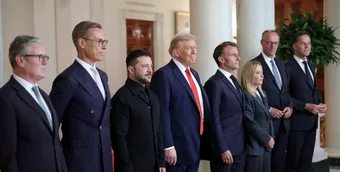
It's like a spectacle: When the Prime Minister performs a law that is not implemented!!!


There is a scene that is being repeated more and more often in Albanian political life: Prime Minister Edi Rama suddenly appears in some city in the country, walks the streets accompanied by cameras and police, identifies an urban problem, usually the occupation of a public space, and decides on the spot: "Get out!" And immediately the "action" begins.
This type of action, which resembles an authoritarian reality show in form, has appeared time and time again throughout these 12 years of socialist governance. But each time it is repeated, it contains a greater dilemma and highlights a painful truth: in Albania we have not built a functioning state, but a theater that is simulated every time the government needs a new act.
Law enforcement in our country has become a personal spectacle. In a normal country, law enforcement is not news. It is not a video. It is not a performance. It is a process. There are institutions that react to citizens' complaints, there are inspectorates that control, there are clear procedures, there are fair and predictable punishments. But in Albania, the law seems to exist only when the Prime Minister articulates it out loud and only when a television camera is turned on.
This is emptying the state of its content and filling it with personal symbolism. Rama does not lead a functioning government, he performs a state that does not exist. He presents himself as the mediator between the citizen and the law, as the direct regulator of injustices, a model that is not reformist, but autocratic in essence.
Why now? And why always after elections or scandals?
It is almost frightening to note that these “spontaneous actions” for urban occupations occur with a strange regularity: always after elections or after a scandal that endangers the image. This time it was the elections but also the polluting burnings in Vlora, Durrës and Elbasan. It is as if the government feels the need to reconfirm itself, to reproduce its moral image after an electoral process or event that often leaves behind only disappointment and distrust.
But these are not new actions. Citizens have repeatedly raised complaints about the concrete that takes over their sidewalks, about the cafes that occupy every corner, about the urban arrogance of the clients of power. In the building where I live, a bar-cafe owner started by taking out a few chairs and tables, and like that experiment with a frog in water that gradually reaches boiling temperature, he built a “second bar” in the streets between the buildings. The residents react, the administrator reacts, the municipal police arrive and the order is thrown at each other. No response. No one listens. Now the residents of the building have become the most loyal clients of that occupation. Until, suddenly, the camera turns on and the “state” descends on the square to “enforce” the law.
This is not only hypocrisy, but emotional manipulation of citizens. It issues an immediate act of justice that looks like a victory for the people, but that changes nothing in the system that produces injustice.
Copycats and the culture of fear
When this model is followed by others, as happened with Interior Minister Hoxha, who also did a copycat performance on the streets of Tirana giving "lessons", then what we have is no longer simply a spectacle, but a transformation of power into central image direction.
In this model, every minister, every mayor, every director, imitates the leader, not to enforce the law, but to appear to do so. And the result is a culture of fear, not order, where the citizen no longer knows what is permissible or forbidden, but feels defenseless in the face of the unexpected will of power.
In this country, the law is replaced by the will of the leader. All of this raises a fundamental question: Do we have a state of law or an autocratic state where the law is only applied when the Prime Minister says so? If the law is there only to be broken with permission, or to be applied by political order, then we no longer have a state, but a power that replaces institutions with the individual.
When one person decides everything, it no longer matters whether he has good intentions or not. What matters is that no one else has any real power to act. And when this happens, the entire society enters a silent regime of dysfunction: citizens no longer complain, because no one listens to them. Institutions no longer react, because they wait for orders. And the media no longer investigate, because the image is enough for them.
We now live in the era of performance, not reform. At the end of the day, what we are seeing is not urban reform, but a controlled choreography of power over reality. It is a way of saying: “I am the only one who can bring order,” forgetting that the task of government is not to put on a show, but to build institutional order that works even when the leader is not there.
Until then, what happens on our streets is not justice, but staging. And the Albanian public is forced to be spectators of a play that never changes the ending.

The Ukraine summit that ignored the tough questions
ideas
top
Alfa recipes
TRENDING 
services
- POLICE129
- STREET POLICE126
- AMBULANCE112
- FIREFIGHTER128



























